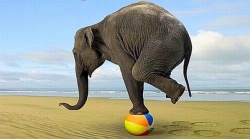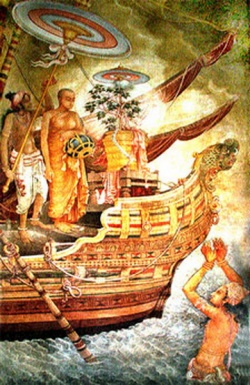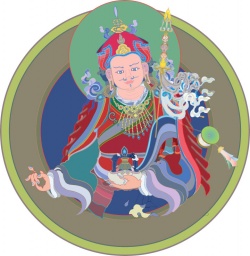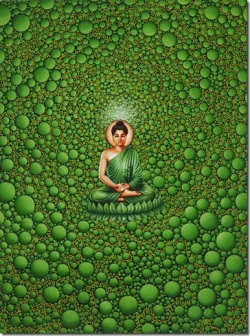Difference between revisions of "Religion and Science"
(Created page with "{{GenerateImages|15}} <poem> by Bhikkhu P. A. Payutto From common beginnings to separation It is commonly asserted that religion arose from the {{Wiki|fear}} of ...") |
|||
| (2 intermediate revisions by 2 users not shown) | |||
| Line 1: | Line 1: | ||
| − | {{GenerateImages| | + | {{GenerateImages|18}} |
<poem> | <poem> | ||
by [[Bhikkhu]] P. A. Payutto | by [[Bhikkhu]] P. A. Payutto | ||
| Line 8: | Line 8: | ||
It is commonly asserted that [[religion]] arose from the {{Wiki|fear}} of [[danger]], particularly natural dangers, such as {{Wiki|lightning}}, floods, earthquakes, volcanic eruptions, and hurricanes. These dangers have threatened [[human beings]] throughout the ages. {{Wiki|Ancient}} man, [[ignorant]] of the workings of [[nature]], could not understand the [[causes]] of these natural forces. Terrified at the threat they presented, he began to search for answers. This quest precipitated an [[interest]] in the [[nature]] that surrounded man, and a [[desire]] to find some solutions to his problems. | It is commonly asserted that [[religion]] arose from the {{Wiki|fear}} of [[danger]], particularly natural dangers, such as {{Wiki|lightning}}, floods, earthquakes, volcanic eruptions, and hurricanes. These dangers have threatened [[human beings]] throughout the ages. {{Wiki|Ancient}} man, [[ignorant]] of the workings of [[nature]], could not understand the [[causes]] of these natural forces. Terrified at the threat they presented, he began to search for answers. This quest precipitated an [[interest]] in the [[nature]] that surrounded man, and a [[desire]] to find some solutions to his problems. | ||
| − | This [[awareness]] of [[danger]] is the common origin of both [[religion]] and [[science]]. The [[desire]] for {{Wiki|security}} was the motivating force for the [[birth]] of [[religion]]. Together with the {{Wiki|fear}} of [[danger]] arose a [[sense]] of wonder at the marvels of [[nature]], which led to the [[desire]] to know its [[truths]]. This was no idle curiosity: [[human beings]] were forced to find out about [[nature]] in order to address the dangers which threatened them. Thus the [[aspiration]] to be free of [[danger]], which was based on {{Wiki|fear}}, indirectly led to the [[desire]] to know nature's [[truths]], which gave [[birth]] to [[science]]. [[Religion]] was born from the [[desire]] to escape [[danger]], and [[science]] was born from the [[desire]] to know nature's [[truths]]. | + | This [[awareness]] of [[danger]] is the common origin of both [[religion]] and [[science]]. The [[desire]] for {{Wiki|security}} was the motivating force for the [[birth]] of [[religion]]. Together with the {{Wiki|fear}} of [[danger]] arose a [[sense]] of [[wonder]] at the marvels of [[nature]], which led to the [[desire]] to know its [[truths]]. This was no idle {{Wiki|curiosity}}: [[human beings]] were forced to find out about [[nature]] in order to address the dangers which threatened them. Thus the [[aspiration]] to be free of [[danger]], which was based on {{Wiki|fear}}, indirectly led to the [[desire]] to know nature's [[truths]], which gave [[birth]] to [[science]]. [[Religion]] was born from the [[desire]] to escape [[danger]], and [[science]] was born from the [[desire]] to know nature's [[truths]]. |
| − | History tells us that the earliest [[forms]] of [[scientific]] research, in such cultures as in {{Wiki|Egypt}} and Mesopotamia, were in fact conducted by {{Wiki|priests}}. They were the first [[people]] to take an [[interest]] in [[nature]] and to devote [[time]] to finding solutions to the dangers that threatened them. | + | History tells us that the earliest [[forms]] of [[scientific]] research, in such cultures as in {{Wiki|Egypt}} and {{Wiki|Mesopotamia}}, were in fact conducted by {{Wiki|priests}}. They were the first [[people]] to take an [[interest]] in [[nature]] and to devote [[time]] to finding solutions to the dangers that threatened them. |
However, the common origin of [[science]] and [[religion]] is also the point at which they parted. The [[reason]] they parted lies within the [[nature]] of [[truth]] itself. The natural dangers which threaten [[humanity]] are immediate concerns, matters of [[life]] and [[death]]. The threat is {{Wiki|tangible}} and urgent. Do what you will, we must have an answer right now. Because all [[people]] are faced equally with the same dangers, answers must be relevant to the whole of {{Wiki|society}}. In such a situation, it is necessary to come up with answers which can be acted upon immediately, answers which put an end to the urgent demands for {{Wiki|security}}. When an answer appears that is acceptable, it is institutionalized as [[religion]]. | However, the common origin of [[science]] and [[religion]] is also the point at which they parted. The [[reason]] they parted lies within the [[nature]] of [[truth]] itself. The natural dangers which threaten [[humanity]] are immediate concerns, matters of [[life]] and [[death]]. The threat is {{Wiki|tangible}} and urgent. Do what you will, we must have an answer right now. Because all [[people]] are faced equally with the same dangers, answers must be relevant to the whole of {{Wiki|society}}. In such a situation, it is necessary to come up with answers which can be acted upon immediately, answers which put an end to the urgent demands for {{Wiki|security}}. When an answer appears that is acceptable, it is institutionalized as [[religion]]. | ||
| − | The practical answers thus provided may take [[forms]], such as [[mystic]] {{Wiki|ceremonies}}, which to the {{Wiki|modern}} [[eye]] would seem absurd, but even so, they are something which can be acted upon immediately. For the mainstream of {{Wiki|society}}, this is what becomes [[religion]]. | + | The {{Wiki|practical}} answers thus provided may take [[forms]], such as [[mystic]] {{Wiki|ceremonies}}, which to the {{Wiki|modern}} [[eye]] would seem absurd, but even so, they are something which can be acted upon immediately. For the {{Wiki|mainstream}} of {{Wiki|society}}, this is what becomes [[religion]]. |
Now there are others who take the [[time]] to gradually collect facts, experiment and analyze. These [[people]], through observation and experiment, arrive at a different set of answers. This is what is known as "[[science]]," the [[knowledge]] that comes from [[gradual]] and systematic observation. | Now there are others who take the [[time]] to gradually collect facts, experiment and analyze. These [[people]], through observation and experiment, arrive at a different set of answers. This is what is known as "[[science]]," the [[knowledge]] that comes from [[gradual]] and systematic observation. | ||
| Line 20: | Line 20: | ||
Here [[religion]] and [[science]] diverge. One answer serves as a remedy for an immediate need, for the masses, and, relying heavily on [[faith]] and [[belief]], lacks systematic observation. This is [[religion]]. [[Religion]], then, is tied to [[faith]]. [[Science]], on the other hand, is a [[discipline]] of [[gradual]] and systematic [[investigation]]. It is not concerned with finding immediate answers, and is available only to the few who are so inclined, not the whole of {{Wiki|society}}. The systematic observation of natural facts has been carried on through the ages by [[interested]] parties, and the resulting institution has become known as "[[science]]." | Here [[religion]] and [[science]] diverge. One answer serves as a remedy for an immediate need, for the masses, and, relying heavily on [[faith]] and [[belief]], lacks systematic observation. This is [[religion]]. [[Religion]], then, is tied to [[faith]]. [[Science]], on the other hand, is a [[discipline]] of [[gradual]] and systematic [[investigation]]. It is not concerned with finding immediate answers, and is available only to the few who are so inclined, not the whole of {{Wiki|society}}. The systematic observation of natural facts has been carried on through the ages by [[interested]] parties, and the resulting institution has become known as "[[science]]." | ||
| − | At this juncture we have one clear distinction between [[religion]] and [[science]]: [[religion]] is for the masses, whereas [[science]] is for a select few. It may be questioned how [[religion]] manages to maintain uniformity in the [[letter]] and the practice of its teachings. This is achieved through [[faith]]. [[Religion]] has its [[roots]] in [[faith]], and uses [[faith]] to preserve its [[teaching]]. [[Religion]] provides an [[unchanging]] [[belief]] system, a {{Wiki|dogma}}, which must be adhered to and upheld, one that is unquestionable. | + | At this juncture we have one clear {{Wiki|distinction}} between [[religion]] and [[science]]: [[religion]] is for the masses, whereas [[science]] is for a select few. It may be questioned how [[religion]] manages to maintain uniformity in the [[letter]] and the practice of its teachings. This is achieved through [[faith]]. [[Religion]] has its [[roots]] in [[faith]], and uses [[faith]] to preserve its [[teaching]]. [[Religion]] provides an [[unchanging]] [[belief]] system, a {{Wiki|dogma}}, which must be adhered to and upheld, one that is unquestionable. |
| − | [[Science]] is accessible to those who are capable of [[understanding]] it, the thinkers. Its [[essence]] is preserved through verifiable [[truths]] and valid methods of experimentation. [[Science]] thus preserves and propagates its [[truths]] through [[wisdom]], or, more specifically, the [[scientific method]]. | + | [[Science]] is accessible to those who are capable of [[understanding]] it, the thinkers. Its [[essence]] is preserved through verifiable [[truths]] and valid [[methods]] of experimentation. [[Science]] thus preserves and propagates its [[truths]] through [[wisdom]], or, more specifically, the [[scientific method]]. |
[[Religion]] seeks to convey an all-embracing, [[absolute truth]], an answer which addresses an immediate need. It might be more accurate to say that the answer thus provided is what becomes known as [[religion]], rather than that [[religion]] provides the answer. There is no institution of [[religion]], as such, which comes up with these answers. It is rather that the answers proposed by [[humanity]] have become institutionalized as [[religion]]. | [[Religion]] seeks to convey an all-embracing, [[absolute truth]], an answer which addresses an immediate need. It might be more accurate to say that the answer thus provided is what becomes known as [[religion]], rather than that [[religion]] provides the answer. There is no institution of [[religion]], as such, which comes up with these answers. It is rather that the answers proposed by [[humanity]] have become institutionalized as [[religion]]. | ||
| − | In one [[sense]], [[religion]] seeks to provide one [[absolute]] answer to the fundamental questions of [[life]], covering all levels, from the [[highest]] to the lowest. [[Science]], on the other hand, attempts to | + | In one [[sense]], [[religion]] seeks to provide one [[absolute]] answer to the fundamental questions of [[life]], covering all levels, from the [[highest]] to the lowest. [[Science]], on the other hand, attempts to observe [[truth]] from its {{Wiki|individual}} [[manifestations]], piece by piece. It is a collection of piecemeal facts which are hoped will gradually lead to an overall picture. |
| − | Even though [[science]], too, wants general {{Wiki|principles}}, its general {{Wiki|principles}} are conditional. They are confined to specific situations and [[conditions]], and are only part of the overall, or fundamental, [[truth]]. We could say that [[religion]] gives a total answer, [[science]] a piecemeal one. | + | Even though [[science]], too, wants general {{Wiki|principles}}, its general {{Wiki|principles}} are [[conditional]]. They are confined to specific situations and [[conditions]], and are only part of the overall, or fundamental, [[truth]]. We could say that [[religion]] gives a total answer, [[science]] a piecemeal one. |
Owing to the limitations of both [[science]] and [[religion]], there arose a third group which, too, aspired to find answers to the fundamental questions of [[life]] and the [[universe]]. They were dissatisfied with [[religion]] because, although it gave such an answer, it was not one that appealed to [[reason]]. [[Science]], on the other hand, although providing answers that were verifiable and appealed to [[reason]], had not yet come up with any [[absolute]] answers. [[Scientific]] research had still not reached the fundamental level of [[reality]]. This third group did not want to wait for science's answers, so they attempted to find answers to those fundamental questions through reasoned analysis, without the need for verification. This system of [[thought]] became another [[science]], known as [[philosophy]]. | Owing to the limitations of both [[science]] and [[religion]], there arose a third group which, too, aspired to find answers to the fundamental questions of [[life]] and the [[universe]]. They were dissatisfied with [[religion]] because, although it gave such an answer, it was not one that appealed to [[reason]]. [[Science]], on the other hand, although providing answers that were verifiable and appealed to [[reason]], had not yet come up with any [[absolute]] answers. [[Scientific]] research had still not reached the fundamental level of [[reality]]. This third group did not want to wait for science's answers, so they attempted to find answers to those fundamental questions through reasoned analysis, without the need for verification. This system of [[thought]] became another [[science]], known as [[philosophy]]. | ||
| Line 44: | Line 44: | ||
Because [[religion]] offers this comprehensive and immediate [[truth]], an answer that is suitable for the masses, but which at the same [[time]] is not verifiable through any of the [[five senses]], it must hinge on [[faith]]. And because these answers are unverified, they will be constantly changing. At one [[time]] one kind of answer is given: [[people]] don't know whether it is true or not, because it can't be verified. If they believe it they accept it. At a later [[time]] a new answer is given. Nobody [[knows]] whether this new answer is true or not either -- it, too, can't be verified. It boils down to preference. Some prefer the older [[belief]], some the newer one. [[Religions]], built as they are on [[faith]], vary in accordance with that [[faith]]. For this [[reason]] we can see at any one [[time]] many different [[religions]]. This is because an all-embracing, [[absolute]] answer cannot be verified, it rests on [[belief]]. When a new answer arises there may be some who believe that, but others won't, and all the answers are equally unverifiable. | Because [[religion]] offers this comprehensive and immediate [[truth]], an answer that is suitable for the masses, but which at the same [[time]] is not verifiable through any of the [[five senses]], it must hinge on [[faith]]. And because these answers are unverified, they will be constantly changing. At one [[time]] one kind of answer is given: [[people]] don't know whether it is true or not, because it can't be verified. If they believe it they accept it. At a later [[time]] a new answer is given. Nobody [[knows]] whether this new answer is true or not either -- it, too, can't be verified. It boils down to preference. Some prefer the older [[belief]], some the newer one. [[Religions]], built as they are on [[faith]], vary in accordance with that [[faith]]. For this [[reason]] we can see at any one [[time]] many different [[religions]]. This is because an all-embracing, [[absolute]] answer cannot be verified, it rests on [[belief]]. When a new answer arises there may be some who believe that, but others won't, and all the answers are equally unverifiable. | ||
| − | In contrast, [[science]] answers slowly and methodically, verifying each point as it goes. It solves problems rationally. At any given [[time]] there is only one [[science]]. It is often said, "There are many [[religions]], but only one [[science]]." However, from a historical {{Wiki|perspective}} it can be said that there are many {{Wiki|sciences}}, because [[science]] doesn't give a total [[view]] of [[truth]]. Theories about the [[nature]] of the [[universe]] vary from [[time]] to [[time]]. For example, at one [[time]] [[science]] favored the {{Wiki|Ptolemaic}} [[universe]], which portrayed an earth-centered model. Then came the Copernican System, with the {{Wiki|heliocentric}} {{Wiki|solar system}}, and then there were the {{Wiki|Cartesian}} and Newtonian systems, and now we have the [[universe]] of the new {{Wiki|physics}}. Science's picture of [[reality]] has been constantly changing. [[Nature]], or the [[universe]], according to the {{Wiki|modern}} theories of {{Wiki|physics}}, whether the {{Wiki|quantum}} or [[relativity]] theories, is completely different from the [[universe]] in the [[time]] of Newton. In this [[sense]] there have been many {{Wiki|sciences}}. | + | In contrast, [[science]] answers slowly and methodically, verifying each point as it goes. It solves problems {{Wiki|rationally}}. At any given [[time]] there is only one [[science]]. It is often said, "There are many [[religions]], but only one [[science]]." However, from a historical {{Wiki|perspective}} it can be said that there are many {{Wiki|sciences}}, because [[science]] doesn't give a total [[view]] of [[truth]]. Theories about the [[nature]] of the [[universe]] vary from [[time]] to [[time]]. For example, at one [[time]] [[science]] favored the {{Wiki|Ptolemaic}} [[universe]], which portrayed an earth-centered model. Then came the Copernican System, with the {{Wiki|heliocentric}} {{Wiki|solar system}}, and then there were the {{Wiki|Cartesian}} and Newtonian systems, and now we have the [[universe]] of the new {{Wiki|physics}}. Science's picture of [[reality]] has been constantly changing. [[Nature]], or the [[universe]], according to the {{Wiki|modern}} theories of {{Wiki|physics}}, whether the {{Wiki|quantum}} or [[relativity]] theories, is completely different from the [[universe]] in the [[time]] of [[Newton]]. In this [[sense]] there have been many {{Wiki|sciences}}. |
| − | It is not only from the historical {{Wiki|perspective}} that there have been many {{Wiki|sciences}}. In the present age there also seem to be many {{Wiki|sciences}} [[existing]] together. There are [[scientists]] who now say that the [[time]] has come for [[science]] to reappraise some of its basic premises. They reject some of the old [[scientific]] premises and talk of a "new {{Wiki|physics}}" and a "new [[science]]." | + | It is not only from the historical {{Wiki|perspective}} that there have been many {{Wiki|sciences}}. In the {{Wiki|present}} age there also seem to be many {{Wiki|sciences}} [[existing]] together. There are [[scientists]] who now say that the [[time]] has come for [[science]] to reappraise some of its basic premises. They reject some of the old [[scientific]] premises and talk of a "new {{Wiki|physics}}" and a "new [[science]]." |
| − | [[Science]] deals with the outside [[world]], which is measured by the [[five senses]]. Here [[religion]] differs yet again. It not only looks at the outside [[world]], but also the [[human being]], the one who is observing. While [[science]] concerns itself solely with the [[objects]] of observation, [[religion]] concerns itself with the observer, the one who is using these five [[sense]] bases. Thus, [[religion]] is not confined to {{Wiki|data}} observable through the [[five senses]], but is directly related to the level of development of each {{Wiki|individual}}. The way [[religion]] is [[perceived]] is directly related to the level of [[mental development]] of the {{Wiki|perceiver}}, which gives it an added level of complexity. | + | [[Science]] deals with the outside [[world]], which is measured by the [[five senses]]. Here [[religion]] differs yet again. It not only looks at the outside [[world]], but also the [[human being]], the one who is observing. While [[science]] concerns itself solely with the [[objects]] of observation, [[religion]] concerns itself with the observer, the one who is using these five [[sense]] bases. Thus, [[religion]] is not confined to {{Wiki|data}} observable through the [[five senses]], but is directly related to the level of [[development]] of each {{Wiki|individual}}. The way [[religion]] is [[perceived]] is directly related to the level of [[mental development]] of the {{Wiki|perceiver}}, which gives it an added level of complexity. |
| − | In any case, as far as [[religion]] goes, even though it lays emphasis on the [[human being]], it does so only insofar as the [[human being]] is experiencing a problem, and that problem needs to be dealt with. When looking for the [[causes]] of that problem, however, most [[religions]] look, like [[science]], to the external environment. In this [[respect]], most [[religions]] are similar to [[science]]: they look to the external natural [[world]] as the source of problems or [[suffering]]. | + | In any case, as far as [[religion]] goes, even though it lays {{Wiki|emphasis}} on the [[human being]], it does so only insofar as the [[human being]] is experiencing a problem, and that problem needs to be dealt with. When looking for the [[causes]] of that problem, however, most [[religions]] look, like [[science]], to the external {{Wiki|environment}}. In this [[respect]], most [[religions]] are similar to [[science]]: they look to the external natural [[world]] as the source of problems or [[suffering]]. |
| − | Religion's search for [[truth]] is in order to solve the [[human]] problem, while science's search for [[truth]] is in order to satisfy the [[thirst]] for [[knowledge]]. For most [[religions]], which are compelled to have ready answers, the [[causes]] of problems, whether internal or external, are seen as [[existing]] behind that natural [[world]], in the [[form]] of [[spirits]], [[deities]], [[gods]] or other [[supernatural]] forces. For external {{Wiki|disturbances}}, such as {{Wiki|lightning}}, earthquakes and so on, sacrifices and [[prayers]] are prescribed. For internal {{Wiki|disturbances}}, such as [[sickness]], [[mental]] {{Wiki|disease}} or hysteria, mediums or [[spirit]] healers perform [[mystic]] {{Wiki|ceremonies}}. Meanwhile [[science]], not being compelled to find any immediate remedies, slowly and systematically goes about its search for {{Wiki|data}}. | + | Religion's search for [[truth]] is in order to solve the [[human]] problem, while science's search for [[truth]] is in order to satisfy the [[thirst]] for [[knowledge]]. For most [[religions]], which are compelled to have ready answers, the [[causes]] of problems, whether internal or external, are seen as [[existing]] behind that natural [[world]], in the [[form]] of [[spirits]], [[deities]], [[gods]] or other [[supernatural]] forces. For external {{Wiki|disturbances}}, such as {{Wiki|lightning}}, earthquakes and so on, [[sacrifices]] and [[prayers]] are prescribed. For internal {{Wiki|disturbances}}, such as [[sickness]], [[mental]] {{Wiki|disease}} or hysteria, mediums or [[spirit]] healers perform [[mystic]] {{Wiki|ceremonies}}. Meanwhile [[science]], not being compelled to find any immediate remedies, slowly and systematically goes about its search for {{Wiki|data}}. |
| − | The natural [[religions]], [[Buddhism]] in particular, have a special [[interest]] in the [[human]] [[condition]], but they do not see the source of problems entirely in the external [[world]]. [[Buddhism]] looks for the source of problems within the entire process of [[causes]] and [[conditions]] -- including those within the [[human being]], such as wrong ways of [[thinking]] -- be they internal or external, material or {{Wiki|immaterial}}, [[physical]] or [[mental]]. | + | The natural [[religions]], [[Buddhism]] in particular, have a special [[interest]] in the [[human]] [[condition]], but they do not see the source of problems entirely in the external [[world]]. [[Buddhism]] looks for the source of problems within the entire process of [[causes]] and [[conditions]] -- [[including]] those within the [[human being]], such as wrong ways of [[thinking]] -- be they internal or external, material or {{Wiki|immaterial}}, [[physical]] or [[mental]]. |
Among ordinary [[religions]], there are many that teach the treatment of problems by appropriate means, through [[morality]] or [[ethics]], which seems to indicate an [[understanding]] of the internal factors contributing to them, but this is not necessarily the case. In fact, such practice is often done not with {{Wiki|real}} [[understanding]] of these factors, but out of {{Wiki|obedience}} to some external, [[supernatural]] force. The relationship is one between mankind and an external power. [[Ethical]] {{Wiki|behavior}} in these [[religions]] is usually done in order to avoid {{Wiki|punishment}}, or to gain favors or [[blessings]], rather than through [[awareness]] of the factors occurring in the natural {{Wiki|processes}}. | Among ordinary [[religions]], there are many that teach the treatment of problems by appropriate means, through [[morality]] or [[ethics]], which seems to indicate an [[understanding]] of the internal factors contributing to them, but this is not necessarily the case. In fact, such practice is often done not with {{Wiki|real}} [[understanding]] of these factors, but out of {{Wiki|obedience}} to some external, [[supernatural]] force. The relationship is one between mankind and an external power. [[Ethical]] {{Wiki|behavior}} in these [[religions]] is usually done in order to avoid {{Wiki|punishment}}, or to gain favors or [[blessings]], rather than through [[awareness]] of the factors occurring in the natural {{Wiki|processes}}. | ||
| Line 60: | Line 60: | ||
[[Religions]], many and varied at the one [[time]], address the needs of different levels of [[people]]. At any one [[time]] {{Wiki|society}} consists of many different levels of [[virtue]] and [[understanding]], thus the need for many [[religions]], answering many different levels of need. | [[Religions]], many and varied at the one [[time]], address the needs of different levels of [[people]]. At any one [[time]] {{Wiki|society}} consists of many different levels of [[virtue]] and [[understanding]], thus the need for many [[religions]], answering many different levels of need. | ||
| − | In the past, [[scientific]] [[truths]] were verifiable through the [[five senses]], but this is no longer the case. With the passage of [[time]] it has become necessary to develop instruments, such as the {{Wiki|telescope}} and the microscope, to extend the capabilities of these [[senses]]. Nowadays even those instruments have reached their limits, making it necessary to develop even more complex instruments and test {{Wiki|hypotheses}} with {{Wiki|mathematics}}. {{Wiki|Mathematical}} [[languages]] and computers are the newest instruments of verification. | + | In the {{Wiki|past}}, [[scientific]] [[truths]] were verifiable through the [[five senses]], but this is no longer the case. With the passage of [[time]] it has become necessary to develop instruments, such as the {{Wiki|telescope}} and the microscope, to extend the capabilities of these [[senses]]. Nowadays even those instruments have reached their limits, making it necessary to develop even more complex instruments and test {{Wiki|hypotheses}} with {{Wiki|mathematics}}. {{Wiki|Mathematical}} [[languages]] and computers are the newest instruments of verification. |
| − | Science's development of increasingly complex means of verification has [[caused]] it to become a highly specialized field, accessible to very few [[people]]. It has become impossible for the average man to | + | Science's [[development]] of increasingly complex means of verification has [[caused]] it to become a highly specialized field, accessible to very few [[people]]. It has become impossible for the [[average man]] to observe the [[truths]] of [[science]], because the instruments are not available to him. |
| − | [[Religion]], on the other hand, belongs to the masses. It is available for the average man, who is free to accept or reject it without the need for proof. Although it is true that some [[religions]], like [[science]], reserve their [[truths]] for a select few, the {{Wiki|priests}} or [[monks]], and even reserve the right to [[spiritual]] attainments, this is more a result of manipulations by certain {{Wiki|individuals}} than the [[nature]] of [[religions]] themselves. In the natural [[religions]], such as [[Buddhism]], there is no such distinction or exclusion, because [[nature]] is its own [[master]]. How can [[truth]] be monopolized? Each {{Wiki|individual}} has a right to understand and attain the [[truths]] of [[nature]], depending on [[intelligence]] and [[discernment]]. | + | [[Religion]], on the other hand, belongs to the masses. It is available for the [[average man]], who is free to accept or reject it without the need for [[proof]]. Although it is true that some [[religions]], like [[science]], reserve their [[truths]] for a select few, the {{Wiki|priests}} or [[monks]], and even reserve the right to [[spiritual]] [[attainments]], this is more a result of manipulations by certain {{Wiki|individuals}} than the [[nature]] of [[religions]] themselves. In the natural [[religions]], such as [[Buddhism]], there is no such {{Wiki|distinction}} or exclusion, because [[nature]] is its [[own]] [[master]]. How can [[truth]] be monopolized? Each {{Wiki|individual}} has a right to understand and attain the [[truths]] of [[nature]], depending on [[intelligence]] and [[discernment]]. |
| − | Note that there are two kinds of inability to verify [[truths]]. One is through an inability to access the instruments of verification, while the other is because such [[truths]] cannot be verified through the means being used. In the present [[time]] [[science]] is experiencing problems on both counts, especially when attempting to make a statement of [[ultimate truth]], or delving into the [[realm]] of the [[mind]]. | + | Note that there are two kinds of inability to verify [[truths]]. One is through an inability to access the instruments of verification, while the other is because such [[truths]] cannot be verified through the means being used. In the {{Wiki|present}} [[time]] [[science]] is experiencing problems on both counts, especially when attempting to make a statement of [[ultimate truth]], or delving into the [[realm]] of the [[mind]]. |
If the scope of [[science]] is not broadened, it will arrive at a [[dead]] end. In [[science]] there is a very strong [[aspiration]] to answer the fundamental and [[Wikipedia:Absolute (philosophy)|ultimate]] questions of the [[universe]], but we never seem to get near them. Just as [[scientific]] research seems to be getting on the verge of an answer, the [[truth]] seems to slip [[beyond]] reach once more. | If the scope of [[science]] is not broadened, it will arrive at a [[dead]] end. In [[science]] there is a very strong [[aspiration]] to answer the fundamental and [[Wikipedia:Absolute (philosophy)|ultimate]] questions of the [[universe]], but we never seem to get near them. Just as [[scientific]] research seems to be getting on the verge of an answer, the [[truth]] seems to slip [[beyond]] reach once more. | ||
| Line 72: | Line 72: | ||
A clarity that is not free of {{Wiki|confusion}} | A clarity that is not free of {{Wiki|confusion}} | ||
| − | In addition to the new [[science]] and the classical [[science]], or the new {{Wiki|physics}} and the classical {{Wiki|physics}}, we have one [[science]] for the specialists and one for the average man. Many of the [[Wikipedia:concept|concepts]] spoken of in [[science]] are completely [[beyond]] the ability of the average man to [[visualize]]. Not only can he not verify them for himself, he can't even [[grasp]] the [[Wikipedia:concept|concepts]] in question. And this applies not only to the average man: some of the [[Wikipedia:concept|concepts]] of [[science]] are even [[beyond]] the ability of most [[scientists]] to [[visualize]]! One can only take their [[word]] for it. | + | In addition to the new [[science]] and the classical [[science]], or the new {{Wiki|physics}} and the classical {{Wiki|physics}}, we have one [[science]] for the specialists and one for the [[average man]]. Many of the [[Wikipedia:concept|concepts]] spoken of in [[science]] are completely [[beyond]] the ability of the [[average man]] to [[visualize]]. Not only can he not verify them for himself, he can't even [[grasp]] the [[Wikipedia:concept|concepts]] in question. And this applies not only to the [[average man]]: some of the [[Wikipedia:concept|concepts]] of [[science]] are even [[beyond]] the ability of most [[scientists]] to [[visualize]]! One can only take their [[word]] for it. |
| − | Let us take an example. According to [[science]], [[light]] is at once a wave and a {{Wiki|particle}}. [[Scientists]] were trying to define the [[nature]] of [[light]] itself: it's a {{Wiki|particle}}, right? One group said, "Yes, that's right. It's a {{Wiki|particle}}, a stream of photons." But another group said, "No, [[light]] is a wave." In the end it seems that it is both a {{Wiki|particle}} and a wave. But what's that? It has to be proven with {{Wiki|mathematics}}. This kind of thing is [[beyond]] the [[grasp]] of the ordinary [[human]] [[mind]]. | + | Let us take an example. According to [[science]], [[light]] is at once a wave and a {{Wiki|particle}}. [[Scientists]] were trying to define the [[nature]] of [[light]] itself: it's a {{Wiki|particle}}, right? One group said, "Yes, that's right. It's a {{Wiki|particle}}, a {{Wiki|stream}} of photons." But another group said, "No, [[light]] is a wave." In the end it seems that it is both a {{Wiki|particle}} and a wave. But what's that? It has to be proven with {{Wiki|mathematics}}. This kind of thing is [[beyond]] the [[grasp]] of the ordinary [[human]] [[mind]]. |
| − | Let's look at some more examples: astronomers tell us that there are black holes scattered throughout the [[universe]]. These are stars with such extremely high gravitational pulls that even [[light]] cannot escape them, they are absolutely dark. Now what does the average man make of that? Something that even [[light]] cannot escape from?! Now they say that in these black holes both matter and [[energy]] are compacted to such terrific densities that [[nothing]] on this [[earth]] of ours can compare. As an illustration, they say that if all the [[empty]] [[space]] were somehow pressed out of a skyscraper, like the [[Empire]] State Building, 102 stories high, its mass and [[energy]] could be compacted into the size of a needle! A skyscraper! Now what is the man in the street going to make of that? | + | Let's look at some more examples: [[astronomers]] tell us that there are [[black holes]] scattered throughout the [[universe]]. These are {{Wiki|stars}} with such extremely high gravitational pulls that even [[light]] cannot escape them, they are absolutely dark. Now what does the [[average man]] make of that? Something that even [[light]] cannot escape from?! Now they say that in these [[black holes]] both {{Wiki|matter}} and [[energy]] are compacted to such terrific densities that [[nothing]] on this [[earth]] of ours can compare. As an illustration, they say that if all the [[empty]] [[space]] were somehow pressed out of a skyscraper, like the [[Empire]] [[State]] Building, 102 stories high, its {{Wiki|mass}} and [[energy]] could be compacted into the size of a needle! A skyscraper! Now what is the man in the street going to make of that? |
| − | [[Scientists]] say that this is how a black hole is. In fact it's even stranger, because, apart from being the size of a needle, at the same [[time]] it would still weigh as much as the original [[Empire]] State Building. It's [[inconceivable]] -- all we can do is believe them. We've trusted the [[scientists]] for so long, we give them the [[benefit]] of the [[doubt]]. But deep inside we're all wondering, "Huh? How is that possible?" | + | [[Scientists]] say that this is how a black hole is. In fact it's even stranger, because, apart from being the size of a needle, at the same [[time]] it would still weigh as much as the original [[Empire]] [[State]] Building. It's [[inconceivable]] -- all we can do is believe them. We've trusted the [[scientists]] for so long, we give them the [[benefit]] of the [[doubt]]. But deep inside we're all wondering, "Huh? How is that possible?" |
[[Science]] is not yet able to provide an explanation of the {{Wiki|totality}} of [[life]] and the [[world]], it is still engaged in the process of collecting and verifying pieces of {{Wiki|data}}. It can still not explain many of the basic questions of the [[universe]], such as the [[nature]], or even [[existence]], of the basic {{Wiki|particle}}. | [[Science]] is not yet able to provide an explanation of the {{Wiki|totality}} of [[life]] and the [[world]], it is still engaged in the process of collecting and verifying pieces of {{Wiki|data}}. It can still not explain many of the basic questions of the [[universe]], such as the [[nature]], or even [[existence]], of the basic {{Wiki|particle}}. | ||
| Line 90: | Line 90: | ||
| − | Even observable [[phenomena]] are not a certainty. [[Scientists]] use the [[scientific method]] as a means of testing their observations. The main factors of this method are observation and experiment, which must be done until there is no longer room for [[doubt]]. But, even then, the matter is not closed, because of the limitations of the experimental method and the instruments used. | + | Even observable [[phenomena]] are not a {{Wiki|certainty}}. [[Scientists]] use the [[scientific method]] as a means of testing their observations. The main factors of this method are observation and experiment, which must be done until there is no longer room for [[doubt]]. But, even then, the {{Wiki|matter}} is not closed, because of the limitations of the experimental method and the instruments used. |
| − | Let's take as an example Newton's Law of Gravitation. This was a universally accepted [[truth]], a Law, until {{Wiki|Einstein}} came along and said it was not entirely correct. On the subatomic level, the Law of Gravity no longer applies. In Newton's [[time]], however, there were no instruments to | + | Let's take as an example [[Newton's]] Law of Gravitation. This was a universally accepted [[truth]], a Law, until {{Wiki|Einstein}} came along and said it was not entirely correct. On the subatomic level, the Law of Gravity no longer applies. In [[Newton's]] [[time]], however, there were no instruments to observe the subatomic level. Mankind had to wait until the twentieth century and the arrival of {{Wiki|Einstein}}, using {{Wiki|mathematical}} equations and {{Wiki|reasoning}}, to {{Wiki|perceive}} this [[truth]]. So we must be careful. You cannot ultimately believe even experimentation. |
| Line 102: | Line 102: | ||
| − | Towards a unity of [[science]] and [[religion]] | + | Towards a {{Wiki|unity}} of [[science]] and [[religion]] |
| − | [[Science]] is of little direct use to the masses. The [[function]] through which [[science]] should really help the [[people]] is in the field of [[understanding]], but the role it in effect plays is by and large through technology, which does not improve [[understanding]] by any means. In what [[direction]] does technology assist [[humanity]]? Mostly in consumption, often nourishing [[greed]], [[aversion]], or [[delusion]]. Television is invented, and so we are able to watch that. But when [[people]] watch television they don't look at things which are going to increase their [[understanding]] and [[intelligence]], they prefer to look at things which make them more indulgent and heedless. We have communications technology, but rather than using it for developing [[wisdom]] and [[discernment]], it is too often used to encourage [[delusion]]. | + | [[Science]] is of little direct use to the masses. The [[function]] through which [[science]] should really help the [[people]] is in the field of [[understanding]], but the role it in effect plays is by and large through technology, which does not improve [[understanding]] by any means. In what [[direction]] does technology assist [[humanity]]? Mostly in consumption, often nourishing [[greed]], [[aversion]], or [[delusion]]. Television is invented, and so we are able to watch that. But when [[people]] watch television they don't look at things which are going [[to increase]] their [[understanding]] and [[intelligence]], they prefer to look at things which make them more indulgent and heedless. We have {{Wiki|communications}} technology, but rather than using it for developing [[wisdom]] and [[discernment]], it is too often used to encourage [[delusion]]. |
| − | [[Science]] takes no {{Wiki|responsibility}} for the uses its [[knowledge]] is put to, leaving technology to help the masses. Technology, however, doesn't always help; sometimes it is downright harmful. As I said, instead of becoming a tool to create [[benefit]], it becomes a tool for seeking personal gain. Thus, [[science]] leaves the [[people]] in the hands of [[religion]]. Who can you blame? One may ask, "Why does [[religion]] make [[people]] so gullible?" but then it can be countered, "Why does [[science]] abandon the [[people]] to [[religion]]?" | + | [[Science]] takes no {{Wiki|responsibility}} for the uses its [[knowledge]] is put to, leaving technology to help the masses. {{Wiki|Technology}}, however, doesn't always help; sometimes it is downright harmful. As I said, instead of becoming a tool to create [[benefit]], it becomes a tool for seeking personal gain. Thus, [[science]] leaves the [[people]] in the hands of [[religion]]. Who can you blame? One may ask, "Why does [[religion]] make [[people]] so gullible?" but then it can be countered, "Why does [[science]] abandon the [[people]] to [[religion]]?" |
| − | Very few [[people]] have access to the more profound levels of [[science]]. All most [[people]] can do is believe it, they can't really know it. Nowadays [[science]] has become more and more a matter of [[faith]], not [[knowledge]], which puts it on much the same [[standing]] as most [[religions]]. | + | Very few [[people]] have access to the more profound levels of [[science]]. All most [[people]] can do is believe it, they can't really know it. Nowadays [[science]] has become more and more a {{Wiki|matter}} of [[faith]], not [[knowledge]], which puts it on much the same [[standing]] as most [[religions]]. |
| − | When [[science]] is finally able to arrive at the [[truth]], to answer mankind's [[Wikipedia:Absolute (philosophy)|ultimate]] questions, it will be perfected. Many [[religions]] will no longer be sustainable. Conversely, a [[religion]] which points to the [[highest truth]], to [[reality]], will be in a position to unify with [[science]]. At that [[time]] [[science]] and [[religion]] will have reached another meeting point, their last one, where [[religion]] becomes [[science]] and [[science]] becomes [[religion]], the division between the two gone forever. | + | When [[science]] is finally able to arrive at the [[truth]], to answer mankind's [[Wikipedia:Absolute (philosophy)|ultimate]] questions, it will be perfected. Many [[religions]] will no longer be sustainable. Conversely, a [[religion]] which points to the [[highest truth]], to [[reality]], will be in a position to unify with [[science]]. At that [[time]] [[science]] and [[religion]] will have reached another meeting point, their last one, where [[religion]] becomes [[science]] and [[science]] becomes [[religion]], the [[division]] between the two gone forever. |
| Line 122: | Line 122: | ||
Too little, too late | Too little, too late | ||
| − | The real-life problems in {{Wiki|society}} are in need of an immediate answer or remedy -- now, in this present [[life]]. As {{Wiki|individuals}} we are only on this [[earth]] for a limited [[time]]. The situations threatening us give no [[time]] for procrastination. | + | The real-life problems in {{Wiki|society}} are in need of an immediate answer or remedy -- now, in this {{Wiki|present}} [[life]]. As {{Wiki|individuals}} we are only on this [[earth]] for a limited [[time]]. The situations threatening us give no [[time]] for procrastination. |
| Line 130: | Line 130: | ||
| − | [[Scientists]] may counter that [[science]] has helped in many ways. [[People]] with insomnia, {{Wiki|depression}} and [[mental]] problems are all helped by [[drugs]]. [[Science]] is of great [[benefit]] in these areas. It must be conceded that applied [[science]] and technology in the {{Wiki|medical}} fields have helped vast numbers of [[people]]. [[People]] with severe [[mental]] problems are indeed helped to some {{Wiki|degree}} by [[science]], and [[scientists]] may even believe that in the future it will be possible to make [[people]] [[happy]] through the use of [[drugs]]. Whenever you [[feel]] [[unhappy]], just pop a capsule and the [[suffering]] is gone ... but this is no longer [[medicine]], it is hedonism. [[Scientists]] may conduct research into the [[nature]] of the {{Wiki|brain}}, ascertain which particular chemicals are secreted when certain [[emotions]], such as [[happiness]], are [[experienced]], isolate the chemical agent and synthesize it. Then, whenever [[people]] have a [[feeling]] of {{Wiki|depression}} or [[sadness]], they can take this drug and be immediately relieved. With chemicals like this as freely available as [[food]], [[people]] will always be [[happy]], and never again have to [[experience]] {{Wiki|depression}}. | + | [[Scientists]] may counter that [[science]] has helped in many ways. [[People]] with {{Wiki|insomnia}}, {{Wiki|depression}} and [[mental]] problems are all helped by [[drugs]]. [[Science]] is of great [[benefit]] in these areas. It must be conceded that applied [[science]] and technology in the {{Wiki|medical}} fields have helped vast numbers of [[people]]. [[People]] with severe [[mental]] problems are indeed helped to some {{Wiki|degree}} by [[science]], and [[scientists]] may even believe that in the {{Wiki|future}} it will be possible to make [[people]] [[happy]] through the use of [[drugs]]. Whenever you [[feel]] [[unhappy]], just pop a capsule and the [[suffering]] is gone ... but this is no longer [[medicine]], it is {{Wiki|hedonism}}. [[Scientists]] may conduct research into the [[nature]] of the {{Wiki|brain}}, ascertain which particular {{Wiki|chemicals}} are secreted when certain [[emotions]], such as [[happiness]], are [[experienced]], isolate the chemical agent and synthesize it. Then, whenever [[people]] have a [[feeling]] of {{Wiki|depression}} or [[sadness]], they can take this {{Wiki|drug}} and be immediately relieved. With {{Wiki|chemicals}} like this as freely available as [[food]], [[people]] will always be [[happy]], and never again have to [[experience]] {{Wiki|depression}}. |
| − | But then again, reflecting on the dangers of chemicals, there are enough problems in the [[world]] already with [[food]] additives and pesticides, without adding any more. However, this is not the most important point. Even more important is the {{Wiki|perspective}} of values, or quality of [[life]]. The [[objective]] of [[religion]] is to lead [[people]] to freedom. Freedom means the ability to be [[happy]] without the need for external agents, to be more and more independently [[happy]] and less and less dependent on externals, to develop a [[life]] free of enslavement to a mass of external trappings. But the use of [[drugs]] forces [[people]] to lay their [[happiness]] and their [[fate]] more and more into the hands of externals, making them less and less able to [[live]] with themselves. | + | But then again, {{Wiki|reflecting}} on the dangers of {{Wiki|chemicals}}, there are enough problems in the [[world]] already with [[food]] additives and pesticides, without adding any more. However, this is not the most important point. Even more important is the {{Wiki|perspective}} of values, or [[quality]] of [[life]]. The [[objective]] of [[religion]] is to lead [[people]] to freedom. Freedom means the ability to be [[happy]] without the need for external agents, to be more and more {{Wiki|independently}} [[happy]] and less and less dependent on externals, to develop a [[life]] free of enslavement to a {{Wiki|mass}} of external trappings. But the use of [[drugs]] forces [[people]] to lay their [[happiness]] and their [[fate]] more and more into the hands of externals, making them less and less able to [[live]] with themselves. |
| − | In causing [[people]] to depend increasingly on externals, [[science]] is not unlike the {{Wiki|ancient}} [[religions]], which led [[people]] to invest their [[fate]] in the [[gods]] with sacrifices and supplications. In both cases, the [[happiness]] and [[suffering]] of [[human beings]] is [[offered]] up into the hands of external agents, and in [[essence]] they equally destroy man's {{Wiki|independence}}. | + | In causing [[people]] to depend increasingly on externals, [[science]] is not unlike the {{Wiki|ancient}} [[religions]], which led [[people]] to invest their [[fate]] in the [[gods]] with [[sacrifices]] and supplications. In both cases, the [[happiness]] and [[suffering]] of [[human beings]] is [[offered]] up into the hands of external agents, and in [[essence]] they equally destroy man's {{Wiki|independence}}. |
| − | This is what I mean by "too little." [[Science]] on its own is not capable of solving mankind's problems. To use [[Buddhist]] {{Wiki|terminology}}, we could say that [[science]] and technology do not encourage [[people]] to have good {{Wiki|behavior}} ([[sila]]), do not encourage quality in the [[mind]], or inner well-being ([[samadhi]]) and they [[suffer]] from "funnel [[vision]]," in that they seek to amass {{Wiki|data}}, but they do not provide us with the [[knowledge]] of how to lead a [[happy]] [[life]] ([[pañña]]).[*] | + | This is what I mean by "too little." [[Science]] on its [[own]] is not capable of solving mankind's problems. To use [[Buddhist]] {{Wiki|terminology}}, we could say that [[science]] and technology do not encourage [[people]] to have good {{Wiki|behavior}} ([[sila]]), do not encourage [[quality]] in the [[mind]], or inner well-being ([[samadhi]]) and they [[suffer]] from "funnel [[vision]]," in that they seek to amass {{Wiki|data}}, but they do not provide us with the [[knowledge]] of how to lead a [[happy]] [[life]] ([[pañña]]).[*] |
| Line 150: | Line 150: | ||
| − | [[Scientists]] are always looking for a general [[principle]], but they can only arrive at "sub-principles," only pieces of the overall picture. In the meantime, while we are waiting for science's explanation of [[fundamental truth]], we are using it, through technology, to enhance our [[lives]] and pander to our [[desires]]. For the moment, it is technology that is actually giving concrete results rather than [[science]] itself. But technology cannot answer mankind's fundamental questions. For an answer to the [[truth]] (or non-truth) of the natural [[world]], mankind must first rely on [[religion]], using [[science]] only for the convenience [[offered]] through technological progress. This is the situation at the present [[time]]. | + | [[Scientists]] are always looking for a general [[principle]], but they can only arrive at "sub-principles," only pieces of the overall picture. In the meantime, while we are waiting for science's explanation of [[fundamental truth]], we are using it, through technology, to enhance our [[lives]] and pander to our [[desires]]. For the [[moment]], it is technology that is actually giving concrete results rather than [[science]] itself. But technology cannot answer mankind's fundamental questions. For an answer to the [[truth]] (or non-truth) of the natural [[world]], mankind must first rely on [[religion]], using [[science]] only for the convenience [[offered]] through technological progress. This is the situation at the {{Wiki|present}} [[time]]. |
| − | [[Religion]] is still present in this [[world]] because mankind is still waiting for a complete and [[absolute]] answer, one that is right for the situation and which is immediately practicable. Because such answers cannot be verified, and because [[science]] cannot verify them, most [[people]] are forced to resort to [[belief]]. | + | [[Religion]] is still {{Wiki|present}} in this [[world]] because mankind is still waiting for a complete and [[absolute]] answer, one that is right for the situation and which is immediately practicable. Because such answers cannot be verified, and because [[science]] cannot verify them, most [[people]] are forced to resort to [[belief]]. |
| − | Although [[science]] has made such great advances, all it has done is expand the perceivable limits of the material [[world]]. In terms of answering mankind's fundamental questions and showing man's proper relationship and position in the [[world]], [[science]] seems to have been running in circles and made no {{Wiki|real}} progress. | + | Although [[science]] has made such great advances, all it has done is expand the {{Wiki|perceivable}} limits of the material [[world]]. In terms of answering mankind's fundamental questions and showing man's proper relationship and position in the [[world]], [[science]] seems to have been running in circles and made no {{Wiki|real}} progress. |
| Line 168: | Line 168: | ||
| − | Take for example the drug chloramphenicol. At one [[time]] this drug was very widespread. It was reputed to be a wonder drug, it seemed to cure everything. Whenever you were sick, all you had to do was just go and buy some chloramphenicol, they sold it everywhere. Later on, after about ten years, it was discovered that this drug would gradually build up in the [[body]] and [[cause]] bone marrow to cease production of {{Wiki|blood}} corpuscles, and many [[people]] had [[died]] of leukemia. | + | Take for example the {{Wiki|drug}} chloramphenicol. At one [[time]] this {{Wiki|drug}} was very widespread. It was reputed to be a [[wonder]] {{Wiki|drug}}, it seemed to cure everything. Whenever you were sick, all you had to do was just go and buy some chloramphenicol, they sold it everywhere. Later on, after about ten years, it was discovered that this {{Wiki|drug}} would gradually build up in the [[body]] and [[cause]] [[bone marrow]] to cease production of {{Wiki|blood}} corpuscles, and many [[people]] had [[died]] of leukemia. |
| − | Then there was the case of DDT. At one [[time]] it was [[thought]] that with DDT, our problems with the insect [[world]] were over-ants, mosquitoes ... all gone. [[People]] [[thought]] that they could eradicate these creatures and no longer have to be bothered by them. Many years later it was found that DDT was carcinogenic, an insidious [[substance]] which could prove fatal even to [[humans]]. What's more, while the [[humans]] were [[suffering]] ill effects from the drug, the insect population was becoming immune to it. In [[time]] it has become less effective as an insecticide, and is now more likely to kill the [[human beings]]. Many countries have banned the use of DDT, but [[Thailand]] is still using it, even now. | + | Then there was the case of DDT. At one [[time]] it was [[thought]] that with DDT, our problems with the insect [[world]] were over-ants, mosquitoes ... all gone. [[People]] [[thought]] that they could eradicate these creatures and no longer have to be bothered by them. Many years later it was found that DDT was carcinogenic, an insidious [[substance]] which could prove fatal even to [[humans]]. What's more, while the [[humans]] were [[suffering]] ill effects from the {{Wiki|drug}}, the insect population was becoming immune to it. In [[time]] it has become less effective as an insecticide, and is now more likely to kill the [[human beings]]. Many countries have banned the use of DDT, but [[Thailand]] is still using it, even now. |
| − | Then there was the case of thalidomide. Thalidomide was a [[pain]] killer and tranquillizer which was highly praised by the {{Wiki|medical}} profession. It was reputed to have passed the most rigorous tests, and was trusted so highly that it was announced as an exceptionally safe drug. It was so lauded that even the developed countries, which are normally very {{Wiki|cautious}} about [[drugs]] and {{Wiki|medicines}}, allowed the drug to be bought without a prescription. It was sold for about five years, up until 1961, at which [[time]] it was found that this drug, when taken by {{Wiki|pregnant}} women, [[caused]] deformities in babies. Before the [[danger]] was [[realized]] and the drug recalled from the market, about 8,000 children were born deformed. | + | Then there was the case of thalidomide. Thalidomide was a [[pain]] killer and tranquillizer which was highly praised by the {{Wiki|medical}} profession. It was reputed to have passed the most rigorous tests, and was trusted so highly that it was announced as an exceptionally safe {{Wiki|drug}}. It was so lauded that even the developed countries, which are normally very {{Wiki|cautious}} about [[drugs]] and {{Wiki|medicines}}, allowed the {{Wiki|drug}} to be bought without a prescription. It was sold for about five years, up until 1961, at which [[time]] it was found that this {{Wiki|drug}}, when taken by {{Wiki|pregnant}} women, [[caused]] deformities in babies. Before the [[danger]] was [[realized]] and the {{Wiki|drug}} recalled from the market, about 8,000 children were born deformed. |
| − | Let's take one more example, the case of CFC's (chlorofluorocarbons). This group of chemicals is widely used in refrigerators, [[air]] conditioners and "pressure-pack" spray cans, and they have been used for a long [[time]] with complete [[confidence]]. By the [[time]] we knew what was going on, these chemicals had risen up into the upper levels of the {{Wiki|atmosphere}} and [[caused]] gaps in the ozone layer, causing great [[concern]] among [[scientists]] and environmentalists the [[world]] over. And so a new piece of [[knowledge]] arises -- what we [[thought]] was a good thing turns out to be not so good after all. | + | Let's take one more example, the case of CFC's (chlorofluorocarbons). This group of {{Wiki|chemicals}} is widely used in refrigerators, [[air]] conditioners and "pressure-pack" spray cans, and they have been used for a long [[time]] with complete [[confidence]]. By the [[time]] we knew what was going on, these {{Wiki|chemicals}} had risen up into the upper levels of the {{Wiki|atmosphere}} and [[caused]] gaps in the ozone layer, causing great [[concern]] among [[scientists]] and environmentalists the [[world]] over. And so a new piece of [[knowledge]] arises -- what we [[thought]] was a good thing turns out to be not so good after all. |
| − | The [[emergence]] and development of [[science]] has undoubtedly helped to improve [[understanding]] and the [[human]] {{Wiki|intellect}}, about this there is no argument. But at the same [[time]], if we look closely we will see that it has also [[caused]] [[human]] [[intelligence]] and [[understanding]] to {{Wiki|decline}}. Previously, when [[science]] was just beginning to develop, [[people]] were very impressed with its achievements. There was a great deal of [[excitement]] over the discoveries and technological achievements of [[science]], and [[people]] put all their [[Wikipedia:Hope|hopes]] into [[science]] and technology. All of nature's mysteries were going to be revealed, and [[science]] would lead [[humanity]] into an age of perfect [[happiness]]. Those who wholeheartedly trusted [[science]] began to [[doubt]] [[religions]] and the answers provided by them, and many [[people]] lost [[faith]] entirely and discarded [[religion]]. | + | The [[emergence]] and [[development]] of [[science]] has undoubtedly helped to improve [[understanding]] and the [[human]] {{Wiki|intellect}}, about this there is no argument. But at the same [[time]], if we look closely we will see that it has also [[caused]] [[human]] [[intelligence]] and [[understanding]] to {{Wiki|decline}}. Previously, when [[science]] was just beginning to develop, [[people]] were very impressed with its achievements. There was a great deal of [[excitement]] over the discoveries and technological achievements of [[science]], and [[people]] put all their [[Wikipedia:Hope|hopes]] into [[science]] and technology. All of nature's {{Wiki|mysteries}} were going to be revealed, and [[science]] would lead [[humanity]] into an age of {{Wiki|perfect}} [[happiness]]. Those who wholeheartedly trusted [[science]] began to [[doubt]] [[religions]] and the answers provided by them, and many [[people]] lost [[faith]] entirely and discarded [[religion]]. |
| − | Unfortunately, the [[truth]] dealt with by [[science]] is only a partial one. It deals only with the [[physical]] [[world]]. [[Science]] has no answers to the questions dealing with internal [[human]] problems, the answers for which mankind had previously turned to [[religion]]. This [[renunciation]] of [[religion]] in {{Wiki|modern}} times would not be such a big loss if by [[religion]] we simply meant the institutional [[forms]] of [[religion]], but it means that the part of [[religion]] which deals with solving internal [[human]] problems has also been discarded. With [[science]] taking no [[interest]] in these matters, and [[people]] ignoring them, there arises a break in the stream of [[knowledge]]. The answers which had previously been provided by [[religions]] have been ignored, and mankind's [[mental]] and [[spiritual]] growth has been retarded and even, in some areas, gone into {{Wiki|decline}}. | + | Unfortunately, the [[truth]] dealt with by [[science]] is only a partial one. It deals only with the [[physical]] [[world]]. [[Science]] has no answers to the questions dealing with internal [[human]] problems, the answers for which mankind had previously turned to [[religion]]. This [[renunciation]] of [[religion]] in {{Wiki|modern}} times would not be such a big loss if by [[religion]] we simply meant the institutional [[forms]] of [[religion]], but it means that the part of [[religion]] which deals with solving internal [[human]] problems has also been discarded. With [[science]] taking no [[interest]] in these matters, and [[people]] ignoring them, there arises a break in the {{Wiki|stream}} of [[knowledge]]. The answers which had previously been provided by [[religions]] have been ignored, and mankind's [[mental]] and [[spiritual]] growth has been retarded and even, in some areas, gone into {{Wiki|decline}}. |
| − | The [[nature]] of the [[world]], [[life]] and [[human]] problems, will not allow mankind to ignore the need for [[religion]]. Fundamental, practical and immediate answers are still as much in demand as ever before. When [[science]] is seen to be incapable of providing an answer to this need, and when [[human beings]] tire of their fascination with [[science]], they may come to their [[senses]] and remember this fundamental need within. They may then turn once more to [[religion]] for their answers. But because the stream of [[mental development]] has been interrupted, or set back, their searching will be very erratic, and a fresh start may have to be made. Indications of this can be seen in some of the [[religious]] developments in highly developed countries, where there has been a persistence of [[religious]] {{Wiki|superstition}} and gullibility in spite of being surrounded by a high level of [[scientific]] {{Wiki|sophistication}}. | + | The [[nature]] of the [[world]], [[life]] and [[human]] problems, will not allow mankind to ignore the need for [[religion]]. Fundamental, {{Wiki|practical}} and immediate answers are still as much in demand as ever before. When [[science]] is seen to be incapable of providing an answer to this need, and when [[human beings]] tire of their fascination with [[science]], they may come to their [[senses]] and remember this fundamental need within. They may then turn once more to [[religion]] for their answers. But because the {{Wiki|stream}} of [[mental development]] has been interrupted, or set back, their searching will be very erratic, and a fresh start may have to be made. Indications of this can be seen in some of the [[religious]] developments in highly developed countries, where there has been a persistence of [[religious]] {{Wiki|superstition}} and gullibility in spite of being surrounded by a high level of [[scientific]] {{Wiki|sophistication}}. |
| − | However that may be, [[science]] is not without its [[merits]] and [[blessings]] in leading to better [[understanding]] within [[religious]] circles. The active role [[religion]], especially in its institutional [[forms]], has taken on occasion in suppressing the development of [[human]] [[intelligence]] is well known. Some [[religions]] have clung blindly to absurd [[beliefs]] and practices, even in the face of their own fundamental {{Wiki|principles}}. | + | However that may be, [[science]] is not without its [[merits]] and [[blessings]] in leading to better [[understanding]] within [[religious]] circles. The active role [[religion]], especially in its institutional [[forms]], has taken on occasion in suppressing the [[development]] of [[human]] [[intelligence]] is well known. Some [[religions]] have clung blindly to absurd [[beliefs]] and practices, even in the face of their [[own]] fundamental {{Wiki|principles}}. |
| − | The development of [[science]] and its attitudes and methods has had some [[measure]] of good influence on [[religions]] and [[religious]] attitudes in {{Wiki|society}}. At the very least, it has prodded [[religions]] to reevaluate some of their teachings and attitudes. It has also served as a gauge with which to appraise the answers [[offered]] by different [[religions]]. | + | The [[development]] of [[science]] and its attitudes and [[methods]] has had some [[measure]] of good influence on [[religions]] and [[religious]] attitudes in {{Wiki|society}}. At the very least, it has prodded [[religions]] to reevaluate some of their teachings and attitudes. It has also served as a gauge with which to appraise the answers [[offered]] by different [[religions]]. |
| − | However, from the point of [[view]] of the masses, especially in countries in which outlooks and methods have been heavily influenced by [[science]], [[science]] does not seem to have had a significantly beneficial effect on life-styles and [[mental]] well-being. [[Science]] itself is of not much [[interest]] to most [[people]]. While they look at [[science]] favorably, their [[belief]] in it is really no different from the [[beliefs]] of former generations in [[magical]] forces and the [[occult]]. It is {{Wiki|naive}}, not based on [[knowledge]]. This is "scientism." When most [[people]] think of [[science]], they look straight past it at technology, which they look on as a means for gratifying their [[desires]]. For that [[reason]], the development of [[science]] has had little ennobling influence on the [[knowledge]], [[understanding]], or attitudes of {{Wiki|society}}. | + | However, from the point of [[view]] of the masses, especially in countries in which outlooks and [[methods]] have been heavily influenced by [[science]], [[science]] does not seem to have had a significantly beneficial effect on life-styles and [[mental]] well-being. [[Science]] itself is of not much [[interest]] to most [[people]]. While they look at [[science]] favorably, their [[belief]] in it is really no different from the [[beliefs]] of former generations in [[magical]] forces and the [[occult]]. It is {{Wiki|naive}}, not based on [[knowledge]]. This is "scientism." When most [[people]] think of [[science]], they look straight {{Wiki|past}} it at technology, which they look on as a means for gratifying their [[desires]]. For that [[reason]], the [[development]] of [[science]] has had little ennobling influence on the [[knowledge]], [[understanding]], or attitudes of {{Wiki|society}}. |
| − | On the brighter side, [[people]] seem to be getting over their [[excitement]] about [[science]] and are beginning to look at their needs in [[relation]] to [[religion]]. Many [[religions]] are addressing these needs on different levels. At the same [[time]], some members of [[scientific]] circles are becoming aware of the limitations of {{Wiki|orthodox}} [[science]], and are expanding the horizons of their research to include more [[religious]] perspectives, which suggests the possibility of a fully-developed [[science]] merging with a fully-developed [[religion]], together to lead [[humanity]] to [[reality]], [[peace]], and a [[life]] free of [[foolish]] [[attachments]]. | + | On the brighter side, [[people]] seem to be getting over their [[excitement]] about [[science]] and are beginning to look at their needs in [[relation]] to [[religion]]. Many [[religions]] are addressing these needs on different levels. At the same [[time]], some members of [[scientific]] circles are becoming {{Wiki|aware}} of the limitations of {{Wiki|orthodox}} [[science]], and are expanding the horizons of their research to include more [[religious]] perspectives, which suggests the possibility of a fully-developed [[science]] merging with a fully-developed [[religion]], together to lead [[humanity]] to [[reality]], [[peace]], and a [[life]] free of [[foolish]] [[attachments]]. |
| Line 220: | Line 220: | ||
2. Sir Arthur Stanley Eddington, The [[Nature]] of the [[Physical]] [[World]] ({{Wiki|New York}}: Macmillan, 1929), p.282. [Back to text] | 2. Sir Arthur Stanley Eddington, The [[Nature]] of the [[Physical]] [[World]] ({{Wiki|New York}}: Macmillan, 1929), p.282. [Back to text] | ||
| − | [*] [[Sila]], [[samadhi]] and [[pañña]], or [[moral]] restraint, [[concentration]] and [[wisdom]], are the threefold foundation of [[Buddhist]] training. [Back to text] | + | [*] [[Sila]], [[samadhi]] and [[pañña]], or [[moral]] {{Wiki|restraint}}, [[concentration]] and [[wisdom]], are the threefold foundation of [[Buddhist]] {{Wiki|training}}. [Back to text] |
-oOo- | -oOo- | ||
| − | [Taken from [[Bhikkhu]] P. A. Payutto., Toward Sustainable [[Science]], A [[Buddhist]] Look at Trends in [[Scientific]] Development. (Bangkok: Buddhadhamma Foundation, 1993), pp. 27-52]. | + | [Taken from [[Bhikkhu]] P. A. Payutto., Toward Sustainable [[Science]], A [[Buddhist]] Look at Trends in [[Scientific]] [[Development]]. ([[Bangkok]]: [[Buddhadhamma]] Foundation, 1993), pp. 27-52]. |
</poem> | </poem> | ||
{{R}} | {{R}} | ||
[http://www.tuvienquangduc.com.au/English/science/07buddhismscience.html www.tuvienquangduc.com.au] | [http://www.tuvienquangduc.com.au/English/science/07buddhismscience.html www.tuvienquangduc.com.au] | ||
[[Category:Buddhism And Science]] | [[Category:Buddhism And Science]] | ||
Latest revision as of 17:59, 30 November 2023
by Bhikkhu P. A. Payutto
From common beginnings to separation
It is commonly asserted that religion arose from the fear of danger, particularly natural dangers, such as lightning, floods, earthquakes, volcanic eruptions, and hurricanes. These dangers have threatened human beings throughout the ages. Ancient man, ignorant of the workings of nature, could not understand the causes of these natural forces. Terrified at the threat they presented, he began to search for answers. This quest precipitated an interest in the nature that surrounded man, and a desire to find some solutions to his problems.
This awareness of danger is the common origin of both religion and science. The desire for security was the motivating force for the birth of religion. Together with the fear of danger arose a sense of wonder at the marvels of nature, which led to the desire to know its truths. This was no idle curiosity: human beings were forced to find out about nature in order to address the dangers which threatened them. Thus the aspiration to be free of danger, which was based on fear, indirectly led to the desire to know nature's truths, which gave birth to science. Religion was born from the desire to escape danger, and science was born from the desire to know nature's truths.
History tells us that the earliest forms of scientific research, in such cultures as in Egypt and Mesopotamia, were in fact conducted by priests. They were the first people to take an interest in nature and to devote time to finding solutions to the dangers that threatened them.
However, the common origin of science and religion is also the point at which they parted. The reason they parted lies within the nature of truth itself. The natural dangers which threaten humanity are immediate concerns, matters of life and death. The threat is tangible and urgent. Do what you will, we must have an answer right now. Because all people are faced equally with the same dangers, answers must be relevant to the whole of society. In such a situation, it is necessary to come up with answers which can be acted upon immediately, answers which put an end to the urgent demands for security. When an answer appears that is acceptable, it is institutionalized as religion.
The practical answers thus provided may take forms, such as mystic ceremonies, which to the modern eye would seem absurd, but even so, they are something which can be acted upon immediately. For the mainstream of society, this is what becomes religion.
Now there are others who take the time to gradually collect facts, experiment and analyze. These people, through observation and experiment, arrive at a different set of answers. This is what is known as "science," the knowledge that comes from gradual and systematic observation.
Here religion and science diverge. One answer serves as a remedy for an immediate need, for the masses, and, relying heavily on faith and belief, lacks systematic observation. This is religion. Religion, then, is tied to faith. Science, on the other hand, is a discipline of gradual and systematic investigation. It is not concerned with finding immediate answers, and is available only to the few who are so inclined, not the whole of society. The systematic observation of natural facts has been carried on through the ages by interested parties, and the resulting institution has become known as "science."
At this juncture we have one clear distinction between religion and science: religion is for the masses, whereas science is for a select few. It may be questioned how religion manages to maintain uniformity in the letter and the practice of its teachings. This is achieved through faith. Religion has its roots in faith, and uses faith to preserve its teaching. Religion provides an unchanging belief system, a dogma, which must be adhered to and upheld, one that is unquestionable.
Science is accessible to those who are capable of understanding it, the thinkers. Its essence is preserved through verifiable truths and valid methods of experimentation. Science thus preserves and propagates its truths through wisdom, or, more specifically, the scientific method.
Religion seeks to convey an all-embracing, absolute truth, an answer which addresses an immediate need. It might be more accurate to say that the answer thus provided is what becomes known as religion, rather than that religion provides the answer. There is no institution of religion, as such, which comes up with these answers. It is rather that the answers proposed by humanity have become institutionalized as religion.
In one sense, religion seeks to provide one absolute answer to the fundamental questions of life, covering all levels, from the highest to the lowest. Science, on the other hand, attempts to observe truth from its individual manifestations, piece by piece. It is a collection of piecemeal facts which are hoped will gradually lead to an overall picture.
Even though science, too, wants general principles, its general principles are conditional. They are confined to specific situations and conditions, and are only part of the overall, or fundamental, truth. We could say that religion gives a total answer, science a piecemeal one.
Owing to the limitations of both science and religion, there arose a third group which, too, aspired to find answers to the fundamental questions of life and the universe. They were dissatisfied with religion because, although it gave such an answer, it was not one that appealed to reason. Science, on the other hand, although providing answers that were verifiable and appealed to reason, had not yet come up with any absolute answers. Scientific research had still not reached the fundamental level of reality. This third group did not want to wait for science's answers, so they attempted to find answers to those fundamental questions through reasoned analysis, without the need for verification. This system of thought became another science, known as philosophy.
We could compare these three disciplines, using the fundamental questions of nature as a measuring stick, in this way:
1. Science: is still in the process of verification and observation and is yet to come up with an answer.
2. Philosophy: attempts to give an answer pending verification by using reasoned analysis.
3. Religion: provides an absolute answer which needs no verification.
Both science and philosophy appeared after religion, and both attempt to give clearer answers. However, both of them fail to give answers that are satisfactory and fulfilling for everyday life, and that is why religion still exists and answers a need through faith.
Because religion offers this comprehensive and immediate truth, an answer that is suitable for the masses, but which at the same time is not verifiable through any of the five senses, it must hinge on faith. And because these answers are unverified, they will be constantly changing. At one time one kind of answer is given: people don't know whether it is true or not, because it can't be verified. If they believe it they accept it. At a later time a new answer is given. Nobody knows whether this new answer is true or not either -- it, too, can't be verified. It boils down to preference. Some prefer the older belief, some the newer one. Religions, built as they are on faith, vary in accordance with that faith. For this reason we can see at any one time many different religions. This is because an all-embracing, absolute answer cannot be verified, it rests on belief. When a new answer arises there may be some who believe that, but others won't, and all the answers are equally unverifiable.
In contrast, science answers slowly and methodically, verifying each point as it goes. It solves problems rationally. At any given time there is only one science. It is often said, "There are many religions, but only one science." However, from a historical perspective it can be said that there are many sciences, because science doesn't give a total view of truth. Theories about the nature of the universe vary from time to time. For example, at one time science favored the Ptolemaic universe, which portrayed an earth-centered model. Then came the Copernican System, with the heliocentric solar system, and then there were the Cartesian and Newtonian systems, and now we have the universe of the new physics. Science's picture of reality has been constantly changing. Nature, or the universe, according to the modern theories of physics, whether the quantum or relativity theories, is completely different from the universe in the time of Newton. In this sense there have been many sciences.
It is not only from the historical perspective that there have been many sciences. In the present age there also seem to be many sciences existing together. There are scientists who now say that the time has come for science to reappraise some of its basic premises. They reject some of the old scientific premises and talk of a "new physics" and a "new science."
Science deals with the outside world, which is measured by the five senses. Here religion differs yet again. It not only looks at the outside world, but also the human being, the one who is observing. While science concerns itself solely with the objects of observation, religion concerns itself with the observer, the one who is using these five sense bases. Thus, religion is not confined to data observable through the five senses, but is directly related to the level of development of each individual. The way religion is perceived is directly related to the level of mental development of the perceiver, which gives it an added level of complexity.
In any case, as far as religion goes, even though it lays emphasis on the human being, it does so only insofar as the human being is experiencing a problem, and that problem needs to be dealt with. When looking for the causes of that problem, however, most religions look, like science, to the external environment. In this respect, most religions are similar to science: they look to the external natural world as the source of problems or suffering.
Religion's search for truth is in order to solve the human problem, while science's search for truth is in order to satisfy the thirst for knowledge. For most religions, which are compelled to have ready answers, the causes of problems, whether internal or external, are seen as existing behind that natural world, in the form of spirits, deities, gods or other supernatural forces. For external disturbances, such as lightning, earthquakes and so on, sacrifices and prayers are prescribed. For internal disturbances, such as sickness, mental disease or hysteria, mediums or spirit healers perform mystic ceremonies. Meanwhile science, not being compelled to find any immediate remedies, slowly and systematically goes about its search for data.
The natural religions, Buddhism in particular, have a special interest in the human condition, but they do not see the source of problems entirely in the external world. Buddhism looks for the source of problems within the entire process of causes and conditions -- including those within the human being, such as wrong ways of thinking -- be they internal or external, material or immaterial, physical or mental.
Among ordinary religions, there are many that teach the treatment of problems by appropriate means, through morality or ethics, which seems to indicate an understanding of the internal factors contributing to them, but this is not necessarily the case. In fact, such practice is often done not with real understanding of these factors, but out of obedience to some external, supernatural force. The relationship is one between mankind and an external power. Ethical behavior in these religions is usually done in order to avoid punishment, or to gain favors or blessings, rather than through awareness of the factors occurring in the natural processes.
Religions, many and varied at the one time, address the needs of different levels of people. At any one time society consists of many different levels of virtue and understanding, thus the need for many religions, answering many different levels of need.
In the past, scientific truths were verifiable through the five senses, but this is no longer the case. With the passage of time it has become necessary to develop instruments, such as the telescope and the microscope, to extend the capabilities of these senses. Nowadays even those instruments have reached their limits, making it necessary to develop even more complex instruments and test hypotheses with mathematics. Mathematical languages and computers are the newest instruments of verification.
Science's development of increasingly complex means of verification has caused it to become a highly specialized field, accessible to very few people. It has become impossible for the average man to observe the truths of science, because the instruments are not available to him.
Religion, on the other hand, belongs to the masses. It is available for the average man, who is free to accept or reject it without the need for proof. Although it is true that some religions, like science, reserve their truths for a select few, the priests or monks, and even reserve the right to spiritual attainments, this is more a result of manipulations by certain individuals than the nature of religions themselves. In the natural religions, such as Buddhism, there is no such distinction or exclusion, because nature is its own master. How can truth be monopolized? Each individual has a right to understand and attain the truths of nature, depending on intelligence and discernment.
Note that there are two kinds of inability to verify truths. One is through an inability to access the instruments of verification, while the other is because such truths cannot be verified through the means being used. In the present time science is experiencing problems on both counts, especially when attempting to make a statement of ultimate truth, or delving into the realm of the mind.
If the scope of science is not broadened, it will arrive at a dead end. In science there is a very strong aspiration to answer the fundamental and ultimate questions of the universe, but we never seem to get near them. Just as scientific research seems to be getting on the verge of an answer, the truth seems to slip beyond reach once more.
A clarity that is not free of confusion
In addition to the new science and the classical science, or the new physics and the classical physics, we have one science for the specialists and one for the average man. Many of the concepts spoken of in science are completely beyond the ability of the average man to visualize. Not only can he not verify them for himself, he can't even grasp the concepts in question. And this applies not only to the average man: some of the concepts of science are even beyond the ability of most scientists to visualize! One can only take their word for it.
Let us take an example. According to science, light is at once a wave and a particle. Scientists were trying to define the nature of light itself: it's a particle, right? One group said, "Yes, that's right. It's a particle, a stream of photons." But another group said, "No, light is a wave." In the end it seems that it is both a particle and a wave. But what's that? It has to be proven with mathematics. This kind of thing is beyond the grasp of the ordinary human mind.
Let's look at some more examples: astronomers tell us that there are black holes scattered throughout the universe. These are stars with such extremely high gravitational pulls that even light cannot escape them, they are absolutely dark. Now what does the average man make of that? Something that even light cannot escape from?! Now they say that in these black holes both matter and energy are compacted to such terrific densities that nothing on this earth of ours can compare. As an illustration, they say that if all the empty space were somehow pressed out of a skyscraper, like the Empire State Building, 102 stories high, its mass and energy could be compacted into the size of a needle! A skyscraper! Now what is the man in the street going to make of that?
Scientists say that this is how a black hole is. In fact it's even stranger, because, apart from being the size of a needle, at the same time it would still weigh as much as the original Empire State Building. It's inconceivable -- all we can do is believe them. We've trusted the scientists for so long, we give them the benefit of the doubt. But deep inside we're all wondering, "Huh? How is that possible?"
Science is not yet able to provide an explanation of the totality of life and the world, it is still engaged in the process of collecting and verifying pieces of data. It can still not explain many of the basic questions of the universe, such as the nature, or even existence, of the basic particle.
Science has gone beyond the point where it can be proven with the five senses. Hypotheses are proven through mathematics, which is then interpreted by physicists. The truth is reduced to algebraic equations, which are not in themselves the truth, and don't really clarify the truth in a convincing way. Mathematical symbols have become the new objects of faith. They are interpreted without a direct awareness of reality, which is very nearly the condition that Sir Arthur Eddington spoke of. Sir Arthur Eddington was an English scientist, credited with being the first person to devise a way to prove Einstein's Theory of Relativity, on account of which he was knighted. He said:
"Science is incapable of leading mankind directly to the truth, or reality as such, it can only lead him to a shadow world of symbols."[2]
Even observable phenomena are not a certainty. Scientists use the scientific method as a means of testing their observations. The main factors of this method are observation and experiment, which must be done until there is no longer room for doubt. But, even then, the matter is not closed, because of the limitations of the experimental method and the instruments used.
Let's take as an example Newton's Law of Gravitation. This was a universally accepted truth, a Law, until Einstein came along and said it was not entirely correct. On the subatomic level, the Law of Gravity no longer applies. In Newton's time, however, there were no instruments to observe the subatomic level. Mankind had to wait until the twentieth century and the arrival of Einstein, using mathematical equations and reasoning, to perceive this truth. So we must be careful. You cannot ultimately believe even experimentation.
I am reminded of the story of the chicken and Farmer Brown. Every morning that the chicken sees Farmer Brown, Farmer Brown is carrying some food for him. He sees this every single morning, so it follows that whenever he sees Farmer Brown the chicken gets fed. Chicken sees Farmer Brown = gets fed ... this is the equation. But there comes a morning when the chicken sees Farmer Brown and doesn't get fed, because Farmer Brown isn't carrying food in his hand, he's carrying a knife. The equation "Chicken sees Farmer Brown = gets fed" becomes "Chicken sees Farmer Brown = gets throat cut." So it seems that even verification based on repeated observation cannot be completely trusted, it's still not a foregone conclusion.
Towards a unity of science and religion
Science is of little direct use to the masses. The function through which science should really help the people is in the field of understanding, but the role it in effect plays is by and large through technology, which does not improve understanding by any means. In what direction does technology assist humanity? Mostly in consumption, often nourishing greed, aversion, or delusion. Television is invented, and so we are able to watch that. But when people watch television they don't look at things which are going to increase their understanding and intelligence, they prefer to look at things which make them more indulgent and heedless. We have communications technology, but rather than using it for developing wisdom and discernment, it is too often used to encourage delusion.
Science takes no responsibility for the uses its knowledge is put to, leaving technology to help the masses. Technology, however, doesn't always help; sometimes it is downright harmful. As I said, instead of becoming a tool to create benefit, it becomes a tool for seeking personal gain. Thus, science leaves the people in the hands of religion. Who can you blame? One may ask, "Why does religion make people so gullible?" but then it can be countered, "Why does science abandon the people to religion?"
Very few people have access to the more profound levels of science. All most people can do is believe it, they can't really know it. Nowadays science has become more and more a matter of faith, not knowledge, which puts it on much the same standing as most religions.
When science is finally able to arrive at the truth, to answer mankind's ultimate questions, it will be perfected. Many religions will no longer be sustainable. Conversely, a religion which points to the highest truth, to reality, will be in a position to unify with science. At that time science and religion will have reached another meeting point, their last one, where religion becomes science and science becomes religion, the division between the two gone forever.
Too little, too late
The real-life problems in society are in need of an immediate answer or remedy -- now, in this present life. As individuals we are only on this earth for a limited time. The situations threatening us give no time for procrastination.
Even though science is capable of providing many efficient ways of answering our problems, it is hampered by being "too little, too late." By being "too little," I mean that the knowledge of science is insufficient to solve the fundamental problems of life. It cannot make people good, it cannot make them happy, it cannot show them how to rectify bad habits, it cannot heal suffering, sadness, anger, sorrow, depression and so on. It can't even solve social problems.
Scientists may counter that science has helped in many ways. People with insomnia, depression and mental problems are all helped by drugs. Science is of great benefit in these areas. It must be conceded that applied science and technology in the medical fields have helped vast numbers of people. People with severe mental problems are indeed helped to some degree by science, and scientists may even believe that in the future it will be possible to make people happy through the use of drugs. Whenever you feel unhappy, just pop a capsule and the suffering is gone ... but this is no longer medicine, it is hedonism. Scientists may conduct research into the nature of the brain, ascertain which particular chemicals are secreted when certain emotions, such as happiness, are experienced, isolate the chemical agent and synthesize it. Then, whenever people have a feeling of depression or sadness, they can take this drug and be immediately relieved. With chemicals like this as freely available as food, people will always be happy, and never again have to experience depression.
But then again, reflecting on the dangers of chemicals, there are enough problems in the world already with food additives and pesticides, without adding any more. However, this is not the most important point. Even more important is the perspective of values, or quality of life. The objective of religion is to lead people to freedom. Freedom means the ability to be happy without the need for external agents, to be more and more independently happy and less and less dependent on externals, to develop a life free of enslavement to a mass of external trappings. But the use of drugs forces people to lay their happiness and their fate more and more into the hands of externals, making them less and less able to live with themselves.
In causing people to depend increasingly on externals, science is not unlike the ancient religions, which led people to invest their fate in the gods with sacrifices and supplications. In both cases, the happiness and suffering of human beings is offered up into the hands of external agents, and in essence they equally destroy man's independence.
This is what I mean by "too little." Science on its own is not capable of solving mankind's problems. To use Buddhist terminology, we could say that science and technology do not encourage people to have good behavior (sila), do not encourage quality in the mind, or inner well-being (samadhi) and they suffer from "funnel vision," in that they seek to amass data, but they do not provide us with the knowledge of how to lead a happy life (pañña).[*]
The second objection to science is that it is "too late." Scientific truth is not whole or complete, it is not yet able to give us definitive and final answers, and there is no indication of when it will be able to do so. Scientific knowledge is constantly changing. At one time the truth is thought to be one way, later on it is found to be otherwise. If we had to sit and wait for science to come up with a final answer to the nature of the universe, we would all die first without ever finding out how to conduct our lives.
Scientists are always looking for a general principle, but they can only arrive at "sub-principles," only pieces of the overall picture. In the meantime, while we are waiting for science's explanation of fundamental truth, we are using it, through technology, to enhance our lives and pander to our desires. For the moment, it is technology that is actually giving concrete results rather than science itself. But technology cannot answer mankind's fundamental questions. For an answer to the truth (or non-truth) of the natural world, mankind must first rely on religion, using science only for the convenience offered through technological progress. This is the situation at the present time.
Religion is still present in this world because mankind is still waiting for a complete and absolute answer, one that is right for the situation and which is immediately practicable. Because such answers cannot be verified, and because science cannot verify them, most people are forced to resort to belief.
Although science has made such great advances, all it has done is expand the perceivable limits of the material world. In terms of answering mankind's fundamental questions and showing man's proper relationship and position in the world, science seems to have been running in circles and made no real progress.
Not above blunders
It is not only in the field of pure science that the problem of mistakes arises from time to time. Within the field of applied science and technology, mistakes are common. They are usually not wrongdoings as such, but blunders that arise out of ignorance, oversight or lack of circumspection.
Take for example the drug chloramphenicol. At one time this drug was very widespread. It was reputed to be a wonder drug, it seemed to cure everything. Whenever you were sick, all you had to do was just go and buy some chloramphenicol, they sold it everywhere. Later on, after about ten years, it was discovered that this drug would gradually build up in the body and cause bone marrow to cease production of blood corpuscles, and many people had died of leukemia.
Then there was the case of DDT. At one time it was thought that with DDT, our problems with the insect world were over-ants, mosquitoes ... all gone. People thought that they could eradicate these creatures and no longer have to be bothered by them. Many years later it was found that DDT was carcinogenic, an insidious substance which could prove fatal even to humans. What's more, while the humans were suffering ill effects from the drug, the insect population was becoming immune to it. In time it has become less effective as an insecticide, and is now more likely to kill the human beings. Many countries have banned the use of DDT, but Thailand is still using it, even now.
Then there was the case of thalidomide. Thalidomide was a pain killer and tranquillizer which was highly praised by the medical profession. It was reputed to have passed the most rigorous tests, and was trusted so highly that it was announced as an exceptionally safe drug. It was so lauded that even the developed countries, which are normally very cautious about drugs and medicines, allowed the drug to be bought without a prescription. It was sold for about five years, up until 1961, at which time it was found that this drug, when taken by pregnant women, caused deformities in babies. Before the danger was realized and the drug recalled from the market, about 8,000 children were born deformed.
Let's take one more example, the case of CFC's (chlorofluorocarbons). This group of chemicals is widely used in refrigerators, air conditioners and "pressure-pack" spray cans, and they have been used for a long time with complete confidence. By the time we knew what was going on, these chemicals had risen up into the upper levels of the atmosphere and caused gaps in the ozone layer, causing great concern among scientists and environmentalists the world over. And so a new piece of knowledge arises -- what we thought was a good thing turns out to be not so good after all.
The emergence and development of science has undoubtedly helped to improve understanding and the human intellect, about this there is no argument. But at the same time, if we look closely we will see that it has also caused human intelligence and understanding to decline. Previously, when science was just beginning to develop, people were very impressed with its achievements. There was a great deal of excitement over the discoveries and technological achievements of science, and people put all their hopes into science and technology. All of nature's mysteries were going to be revealed, and science would lead humanity into an age of perfect happiness. Those who wholeheartedly trusted science began to doubt religions and the answers provided by them, and many people lost faith entirely and discarded religion.
Unfortunately, the truth dealt with by science is only a partial one. It deals only with the physical world. Science has no answers to the questions dealing with internal human problems, the answers for which mankind had previously turned to religion. This renunciation of religion in modern times would not be such a big loss if by religion we simply meant the institutional forms of religion, but it means that the part of religion which deals with solving internal human problems has also been discarded. With science taking no interest in these matters, and people ignoring them, there arises a break in the stream of knowledge. The answers which had previously been provided by religions have been ignored, and mankind's mental and spiritual growth has been retarded and even, in some areas, gone into decline.
The nature of the world, life and human problems, will not allow mankind to ignore the need for religion. Fundamental, practical and immediate answers are still as much in demand as ever before. When science is seen to be incapable of providing an answer to this need, and when human beings tire of their fascination with science, they may come to their senses and remember this fundamental need within. They may then turn once more to religion for their answers. But because the stream of mental development has been interrupted, or set back, their searching will be very erratic, and a fresh start may have to be made. Indications of this can be seen in some of the religious developments in highly developed countries, where there has been a persistence of religious superstition and gullibility in spite of being surrounded by a high level of scientific sophistication.
However that may be, science is not without its merits and blessings in leading to better understanding within religious circles. The active role religion, especially in its institutional forms, has taken on occasion in suppressing the development of human intelligence is well known. Some religions have clung blindly to absurd beliefs and practices, even in the face of their own fundamental principles.
The development of science and its attitudes and methods has had some measure of good influence on religions and religious attitudes in society. At the very least, it has prodded religions to reevaluate some of their teachings and attitudes. It has also served as a gauge with which to appraise the answers offered by different religions.
However, from the point of view of the masses, especially in countries in which outlooks and methods have been heavily influenced by science, science does not seem to have had a significantly beneficial effect on life-styles and mental well-being. Science itself is of not much interest to most people. While they look at science favorably, their belief in it is really no different from the beliefs of former generations in magical forces and the occult. It is naive, not based on knowledge. This is "scientism." When most people think of science, they look straight past it at technology, which they look on as a means for gratifying their desires. For that reason, the development of science has had little ennobling influence on the knowledge, understanding, or attitudes of society.
On the brighter side, people seem to be getting over their excitement about science and are beginning to look at their needs in relation to religion. Many religions are addressing these needs on different levels. At the same time, some members of scientific circles are becoming aware of the limitations of orthodox science, and are expanding the horizons of their research to include more religious perspectives, which suggests the possibility of a fully-developed science merging with a fully-developed religion, together to lead humanity to reality, peace, and a life free of foolish attachments.
On the other hand, it may be that science is trying to prove what religion has already predicted. While humanity cannot wait for an answer, we must provide one of some kind, and this answer has become religion. As long as the answer is not proven, we must accept it, while science slowly and methodically tests it out. In this scenario, science is that effort on the part of humanity to prove the truths (or non-truths) of religion. Looking at it in this way, the two fields harmonize; having arisen from a common origin, they eventually merge once more.
As time goes on, the limits of the scientific method will once again be felt. Science will be unable to prove the truths presented by religion. A number of leading scientists are now beginning to realize that this final, ultimate truth spoken of by religion is beyond the reach of science at any point in time.
Footnotes:
2. Sir Arthur Stanley Eddington, The Nature of the Physical World (New York: Macmillan, 1929), p.282. [Back to text]
[*] Sila, samadhi and pañña, or moral restraint, concentration and wisdom, are the threefold foundation of Buddhist training. [Back to text]
-oOo-
[Taken from Bhikkhu P. A. Payutto., Toward Sustainable Science, A Buddhist Look at Trends in Scientific Development. (Bangkok: Buddhadhamma Foundation, 1993), pp. 27-52].

















